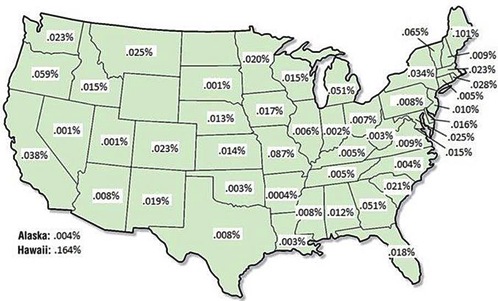Fair Food Network starts SNAP fresh produce program with grocery stores in Michigan
August 28, 2014
Source: The Hagstrom Report
Five years ago when food activist Oran Hesterman started the “Double Up Food Bucks” experiment in Michigan to increase the fruit and vegetable purchasing power of food stamp beneficiaries at farmers markets, a lot of people thought the idea might be too complicated to work.

SNAP use in farmers markets as a percentage of total SNAP food purchases.
(Fair Food Network)
Today Hesterman’s Fair Food Network, a group “dedicated to building a more just and sustainable food system,” released a five-year report touting the success of Double Up, which has distributed $10 coupons to food stamp beneficiaries whose spent $10 at farmers markets.
But perhaps the bigger news is that Fair Food and SpartanNash, a supermarket chain, have launched the nation’s first experiment to make it cheaper for food stamp beneficiaries to buy fresh, locally grown fruits and vegetables at grocery stores.
Under a program that started on August 1 and will continue through the end of the Michigan harvest season on November 30, food-stamp shoppers in three SpartanNash stores who spend $10 on Michigan fruits and vegetables get an additional $10 in purchasing power for the same products for their next shopping trip.
Oran Hesterman
 “Moving Double Up into groceries across the state means we will reach more low-income families and help more Michigan farmers sell more produce to their neighbors,” Hesterman said.
“Moving Double Up into groceries across the state means we will reach more low-income families and help more Michigan farmers sell more produce to their neighbors,” Hesterman said.
The additional purchasing power, which comes from foundations through the Fair Food Network, is put on the SpartanNash loyalty card.
If the grocery store program increases consumption of fresh fruits and vegetables — and initial indications are that produce sales are up 17 percent over a year ago — the sponsors hope to get a federal grant to broaden it.
That money would come from the new Food Insecurity Nutrition Incentive, a grant program established in the 2014 farm bill. It provides $100 million over five years to make it cheaper for low-income people to buy locally produced fresh fruits and vegetables. This fall the Agriculture Department is expected to issue requests for proposal for the new program, which was championed in the farm bill debate by Senate Agriculture Committee Chairwoman Debbie Stabenow, D-Mich.
There can be little question that participants in the food stamp program, formally known as the Supplemental Nutrition Assistance Program or SNAP, want to buy Michigan fruits and vegetables. The report showed that in five years, Double Up has grown from a small pilot in five farmers markets to more than 150 sites benefitting more than 200,000 low-income families and more than 1,000 farmers in 2013 alone, and has had a greater than $5 million effect on Michigan’s economy.
The start of grocery store programs may mean that programs in grocery stores and farmers markets may be competing for the same federal money, but Hesterman says it is vital to “scale up” the Double Bucks program in order to increase the consumption of fruits and vegetables among SNAP beneficiaries and have an impact on their health.
The highest percentage of SNAP purchases in farmers’ markets is in Maine, Hesterman said, and that amounts to only one-tenth of 1 percent of SNAP purchases.
“There are tens of millions of families who need access to fruits and vegetables,” Hesterman said. “We have to take the program where most people get it.”
The United Fresh Produce Association is also enthusiastic about the program and provided the Fair Food Network and SpartanNash with a forum at its convention in Chicago in June to explain the experiment. (See links below)
Brian Harraoja
 Brian Harraoja, SpartanNash’s vice president for fresh merchandising, said the company has a commitment to the “health and wellness” of its customers.
Brian Harraoja, SpartanNash’s vice president for fresh merchandising, said the company has a commitment to the “health and wellness” of its customers.
“Sometimes it’s a little more expensive to eat healthy,” Harrajoa said, adding that the program also benefits Michigan farmers and keeps money in the local economy.
Under federal government rules, grocery stores are not supposed to treat SNAP beneficiaries differently or market to them specifically, but Fair Food Network has obtained a waiver from USDA to try the Double Up program.
SpartanNash picked its Family Fare stores in Battle Creek and Grand Rapids and an independent Parkway Foods in Detroit to start.
The company has also paid for software that allows the additional benefits to be loaded on the store’s loyalty card.
Fair Food Network came up with the model and raised the money for the four-month experiment from the W.K. Kellogg Foundation, the Dyer-Ives Foundation, the Frey Foundation, the Robert Wood Johnson Foundation, the AARP Foundation, the AFPD Foundation, the Carls Foundation, the United Way for Southeastern Michigan, and the McGregor Fund.
While the grocery store experiment is only a few weeks old, Hesterman is already looking far ahead.
The first USDA grants, he said, will “provide the evidence” for Congress to expand the program in the next farm bill.
First posted at The Hagstrom Report on August 19, 2014.







